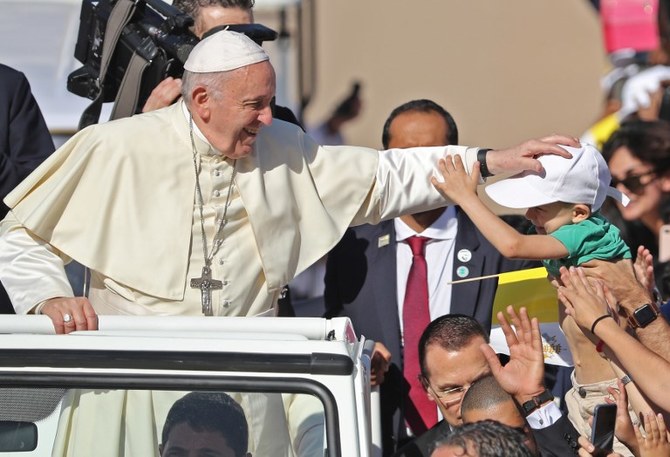DUBAI: Christians around the world are marking Easter in unconventional ways this year because of the coronavirus disease (COVID-19) pandemic.
Places of worship are currently closed in the UAE as part of a nationwide drive to halt the spread of COVID-19.
Aline Khatchadourian Moujalli, a Lebanese resident of Dubai, said Easter is one of her favorite holidays. In recent years, she and her husband Jad have flown to Lebanon to celebrate Easter with his family and friends in his hometown, Akar.
“They all come over to his parents’ house, where his mother cooks for everyone,” Aline told Arab News. “Unfortunately, this year, it’s not going to be the case. It will be just him and me here in Dubai.”
With airports shuts and flights suspended, the couple — like so many others — will be away from their loved ones during what should be a special weekend.
CHRISTIANS IN UAE
1,110,000 (12.9%)
Source: Pew Research Center (projections for 2020)
“It’s a bit tough, especially given the situation we are in,” she said. “We are locked at home, and the only thing we have is Zoom to talk to our families and hear their voices.”
The Moujallis intend to order food at home, pray, and connect online with family members. “Easter is an important holiday for me, because I usually go to church, pray and then feast on a nice lunch with my loved ones,” Moujalli said. “It won’t be the same this year and going to church is not a possibility, but I hope this will be over very soon.”
For Andrea Paoli, a Lebanese Christian in Dubai, the spirit of Easter has been difficult to detect this year.
“It’s quite odd to be celebrating Easter in the circumstances,” she told Arab News. “What this experience has mostly taught me is that we don’t really need to have all the rituals and festivities around holidays to be in communion.”
Paoli thinks this Easter will be a good time for deep reflection and reconnection with her core beliefs.
“As the world unites in fighting this invisible enemy, I see an incredible movement of support and compassion,” she said. “I see people rethinking our relationship with the environment and nature. I see global solidarity and deep gratitude. I believe our isolated Easter celebrations will only reinforce the strong message of love.”

The first chocolate Easter eggs appeared in France and Germany in the 19th Century, but they were bitter and hard.
For Soraya Jouzy, a British-Palestinian living in Dubai, Easter is a “very big deal.” She considers it to be a time for cleansing the mind and body.
“It’s a time of reflection — and that’s even more heightened this year,” she said. “It resonates even more with how to be connected with yourself to give you the necessary strength, guidance and clarity.”
Jouzy is one of the lucky few who will get to celebrate Easter with her parents, who are also in Dubai.
“I’m going to enjoy this time with my parents, prepare an Easter meal and go on Zoom to watch the kids in our family do an Easter-egg hunt, while we light all the candles in our house,” she told Arab News. “We hope Bethlehem will live-stream the midnight Mass like they do every year.”
Jouzy considers it a blessing to be with her family now, and wants to make full use of it by connecting with her Christian friends via Zoom.
“It’s important to rejoice and celebrate with all people of faith and fill everyone with that energy, especially in these times,” she said. “There’s a lot of love going around and it’s beautiful. It’s important we have that sense of love and I’m thankful I’m here with my family.”



























